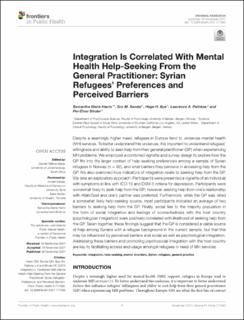| dc.contributor.author | Harris, Samantha Marie | |
| dc.contributor.author | Sandal, Gro Mjeldheim | |
| dc.contributor.author | Bye, Hege Høivik | |
| dc.contributor.author | Palinkas, Lawrence A. | |
| dc.contributor.author | Binder, Per-Einar | |
| dc.date.accessioned | 2022-02-01T08:13:36Z | |
| dc.date.available | 2022-02-01T08:13:36Z | |
| dc.date.created | 2021-12-01T15:39:13Z | |
| dc.date.issued | 2021 | |
| dc.identifier.issn | 2296-2565 | |
| dc.identifier.uri | https://hdl.handle.net/11250/2976164 | |
| dc.description.abstract | Despite a seemingly higher need, refugees in Europe tend to underuse mental health (MH) services. To better understand this underuse, it is important to understand refugees' willingness and ability to seek help from their general practitioner (GP) when experiencing MH problems. We employed a combined vignette and survey design to explore how the GP fits into the larger context of help-seeking preferences among a sample of Syrian refugees in Norway (n = 92), and what barriers they perceive in accessing help from the GP. We also examined how indicators of integration relate to seeking help from the GP. We take an exploratory approach. Participants were presented a vignette of an individual with symptoms in line with ICD-10 and DSM-5 criteria for depression. Participants were somewhat likely to seek help from the GP; however, seeking help from one's relationship with Allah/God and one's partner was preferred. Furthermore, while the GP was rated a somewhat likely help-seeking source, most participants indicated an average of two barriers to seeking help from the GP. Finally, social ties to the majority population in the form of social integration and feelings of connectedness with the host country (psychological integration) were positively correlated with likelihood of seeking help from the GP. Taken together, these findings suggest that the GP is considered a viable source of help among Syrians with a refugee background in the current sample, but that this may be influenced by perceived barriers and social as well as psychological integration. Addressing these barriers and promoting psychosocial integration with the host country are key to facilitating access and usage amongst refugees in need of MH services. | en_US |
| dc.language.iso | eng | en_US |
| dc.publisher | Frontiers Media | en_US |
| dc.rights | Navngivelse 4.0 Internasjonal | * |
| dc.rights.uri | http://creativecommons.org/licenses/by/4.0/deed.no | * |
| dc.title | Integration Is Correlated With Mental Health Help-Seeking From the General Practitioner: Syrian Refugees' Preferences and Perceived Barriers | en_US |
| dc.type | Journal article | en_US |
| dc.type | Peer reviewed | en_US |
| dc.description.version | publishedVersion | en_US |
| dc.rights.holder | Copyright 2021 Harris, Sandal, Bye, Palinkas and Binder | en_US |
| dc.source.articlenumber | 777582 | en_US |
| cristin.ispublished | true | |
| cristin.fulltext | original | |
| cristin.qualitycode | 1 | |
| dc.identifier.doi | 10.3389/fpubh.2021.777582 | |
| dc.identifier.cristin | 1962911 | |
| dc.source.journal | Frontiers In Public Health | en_US |
| dc.identifier.citation | Frontiers In Public Health. 2021, 9, 777582. | en_US |
| dc.source.volume | 9 | en_US |

